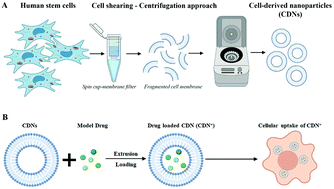Investigation of human adipose stem cell-derived nanoparticles as a biomimetic carrier for intracellular drug delivery†
Abstract
Prevailing drug delivery strategies rely on the use of synthetic nanocarriers like metal nanoparticles and polymeric liposomes to control the release of therapeutics in a safe and efficacious manner. Despite their high efficiency in encapsulating drugs, these systems exhibit low to moderate biocompatibility, low cellular uptake, and sub-optimal targeting capabilities. Conversely, cell-derived nanoparticles (CDNs) have emerged as a promising alternative to these artificial drug delivery carriers for achieving safer clinical outcomes. In this study, we have generated CDNs from human adipose-derived stem cells (hASCs) using a high-yield fabrication strategy. Briefly, hASCs were subjected to a cell-shearing approach that entails passing the cells through an array of filters, along with serial centrifugations to eliminate intracellular contents. Ultimately, the fragmented parent cell membrane self-assembles to form the CDNs. This strategy successfully converted 80% of the plasma membrane into the novel nanocarriers with an average hydrodynamic diameter of 100 nm. Stability analysis confirmed that the formulated nanocarriers are stable for over 3 weeks, making them a potent candidate for long-term therapies. To demonstrate their potential in drug delivery, we encapsulated trehalose, a cell-impermeable sugar molecule, into the CDNs via an extrusion loading technique. Drug-loaded CDNs were effectively internalized into human umbilical vein endothelial cells (HUVECs) and hASCs, without inducing any significant cytotoxicity. Overall, the findings of this study establish the potential of hASC-derived CDNs as customizable biomimetic nanocarriers for drug delivery and other translational medicine applications.



 Please wait while we load your content...
Please wait while we load your content...